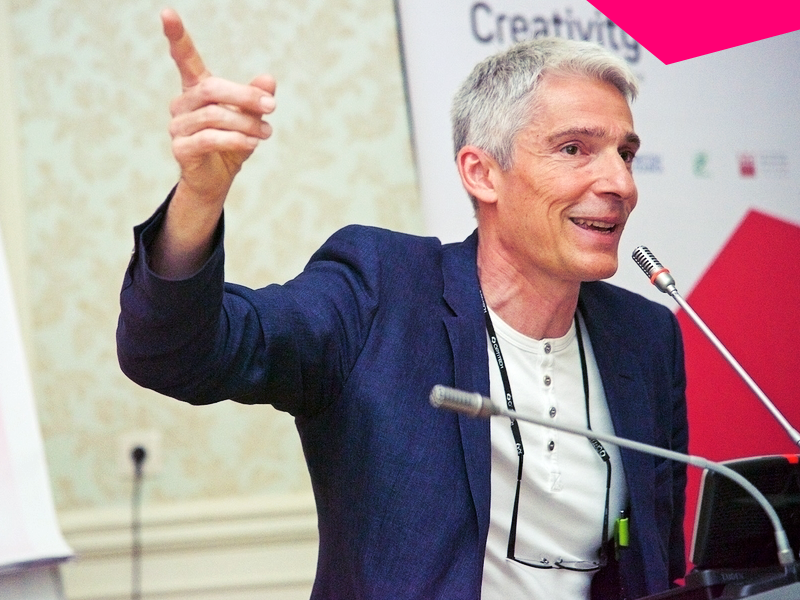
Mikko Fritze: “Culture is not a factory where you know everything with certainty”
— Mikko, could you tell us what cultural leadership is in the modern world?
— I think that cultural leadership is relatively complicated in the sense that it is difficult to plan anything in this sphere. Sometimes you begin a certain project and you know what you need to begin with, but often you do not understand where that beginning is. Besides, you are managing projects in an area where people put their heart and soul into their work, and you are there with your press conferences and reports. It is always difficult to work with cultural projects, after all it is not a factory where you can produce something in stages, speed up the process or change production modes. In culture, you never definitely know anything with certainty. And this is precisely the biggest problem of cultural management.
— What skills should a cultural leader possess?
— I can only talk about my own experience of cultural leadership. I think if you manage such processes, what you need most of all is trust. You have to trust in the people who are this work, you have to trust in your team. It is unwise to manage a team by telling them what they should do. You have to learn to trust and empathise, to feel and understand people and the problems that they face. In reality, people are not afraid of being managed or afraid of being led. They are afraid of not being respected. Therefore, if you don’t respect your team, if you’re not in tune with them, you’ll have a difficult time.
You will most likely also need knowledge about the structure of society, data about the history of the development of culture in the region, town or country where you’re working, or the continent in general. Perhaps this is difficult to do in one go, without studying these basics at university or somewhere else, but if you want to work in this field, such knowledge is really necessary.
When it comes to working in a foreign country, it is very important to know the language, especially if you’re constantly changing locations or doing something unique to this area. And even more so if you have a local or national project, knowing the language is indispensable – knowing English alone won’t do in this case. For example, I’m German, but I managed a project in Estonia. It was a national project for the development of a European capital of culture. A huge project, the discovery of one’s culture of sorts and the implementation of something very important for the country. And I wouldn’t have been able to fully communicate with people if I didn’t know Estonian.
In addition, a cultural leader must be open, curious and take others into consideration. Sure he has to control his team and set boundaries for what is happening, but he also has to know how to give people the freedom to do what they want and not to limit their actions ahead of time.
It is important to communicate with your team, ask their opinions, but at some point you should not be ashamed to show your leadership skills and say: “This won’t work” or sum up by saying: “That’s a good idea, we’ll go with that”.
You have to take responsibility, but you shouldn’t be afraid of admitting that there are things that you might not know. Ask! Let’s say you are working with ten people: in all cases, they know more than you do. Just show them that they know more than you, that they have a certain freedom, and that they can convince you of something. They’ll appreciate it.

— What specific professional knowledge and skills are important for a successful career as a cultural leader? Is it important to have a specialist education in cultural management?
— We can talk endlessly about that. If you’re a cultural leader and, for example, you’re producing a theatre play, you probably know what you want, what to say to people and what to do. You must also have the skills of a good speaker; in this case you can and should be charismatic, even a little forceful. But sometimes things are different. For example, when you’re working with developing a European capital of culture, you begin from scratch, a clean slate. In that case, what you need is patience, the skill of listening to people, the desire to share knowledge, make joint decisions. These are completely different styles of cultural leadership: knowing what you want and seeing it to the end, and creating something new.
If you’re a soft person and you know it, it is difficult for you to be forceful. Fine, be soft, but in certain cases be strict enough. You simply have to know how to bring people together in a subtle way. Here the factor of personality is important. For example, during my seminars, I never call for work or action – I simply talk about my own experience and say why I work the way I do.
To look at how other people act in similar situations is also quite interesting. In such a case, you can sometimes take in something new for yourself, especially if it worked in my case. It is very difficult to make generalizations, but as I mentioned earlier on, if you’re a leader in the cultural sphere in a specific society, you have to understand the culture of this society. Particularly if you’re working with project development. I think it is quite difficult to set out to a small African city and put on a play there.
— And immediately become a local cultural leader?
— You can create a certain project, but this won’t mean that you’ve become a leader. Perhaps, all that you can do is motivate people.

— How can cultural managers build a successful career in cultural leadership?
— It’s difficult for me to give specific tips, as I don’t know the situation in Ukraine. But I can say that you have to love your work and be able to cope with unpredictable and irregular loads. Sometimes you can certainly influence something, at some moment you can even plan, but in general, this work itself is quite unpredictable and difficult to assess. You certainly would want to succeed, but often at the outset of a project it is hard to say if anything will come of it. And if you do succeed, it is hard to reckon by how much. From a commercial point of view it can be calculated, but the value of art cannot always be measured in monetary terms.
— What are the main challenges that cultural leaders face?
— I think that today a big problem and challenge for any cultural leader is whether he would be able to do something so that people see in his work not just money, commercial benefit and demand. This is really what governs our world, and sometimes even drives it completely reasonably, because people have to make money. But one of art’s main goals is to get people to look deeper, and if you can achieve that, this is success. Let’s be honest, many people think that happiness can be bought. I don’t subscribe to that. Art is a sphere where you can talk about that, where you can show that, where you can even make people happy with something other than money.
— How should a cultural leader work with his team? What are the specifics of the way in which he interacts with people from other spheres?
— First of all, you shouldn’t be too arrogant. I believe that cultural leaders as creative people (yes, indeed, most of us are) sometimes think that they’re better than others simply for the reason that they work in the cultural sphere. That’s not true. You should establish a different kind of relationship with people. Because in most cases this is similar to regular human interaction, and in others you need something from them, possibly money. This is precisely the specificity of this sector. Or perhaps you’re expecting certain decisions from them. You need them to approve something. Well, these are the laws of business. And business methods often conflict with the established methods of the cultural sphere. For example, you might not get the money until you explain your budget. If you need a budget, it’s necessary to know how sponsorship works, where is that business balance, and...
– …and know something about fundraising, for example?
– Yes, I mean fundraising. It’s not a science, but there are things to learn there too. And you have to clearly understand what you want and what you can offer your partners before going to meetings and wasting other people’s time. It’s very important.
For example, politics and communication with people from this sector are slightly different things. Officials finance culture, invest money in the development of the country. At the same time, you want to be independent from them, but it’s not possible. It is a real contradiction, which cannot be reasonably resolved. Perhaps you’ll get lucky and get to work with absolutely loyal officials, who have enough money to do everything the way you want it to be done; but this happens fairly rarely. It is very important to always maintain a relationship with these people because if you don’t maintain and develop relations, this often has a negative impact on culture.

– You have extensive experience in cultural management and cultural leadership. Could you give any specific recommendations to cultural managers who want to become leaders: what to read, what educational courses or training programmes to consider?
– I’m not sure about books, but in Germany, for example, there are many relevant specialisations in universities. You can study to become a cultural manager; you can also look for educational programmes. I think that most leaders in the cultural sphere had studied something completely different in their day: the history of culture or art or something like that, but definitely not management. But no matter what your background is, I think all knowledge would come in handy. In general, the majority of cultural leaders don’t have time for courses – they work, implement projects.
And we come back to trusting people with whom you work. If you’re working with projects, you should know how to easily assess them. If you’re addressing people with a speech, give them a piece of paper later and ask them: “Did you understand what I said? Did you like what I was saying? Was it fun or serious enough?” Try to receive as much feedback as possible. It is the only way to become really successful. Sometimes it can be quite painful. To be honest with oneself is really hard, but without that you won’t be able to learn anything, especially if you’re working in the cultural sphere. Feedback is the X factor. But to get it, you have to establish a relationship of trust. But it will help you to develop like nothing else. These are very important things, and although everybody knows about them for some reason, most people ignore them.
— What areas of culture, in your opinion, lead the way around the world today?
— That’s quite a hard question. Each city, big or small, each country has its leaders. If we consider the global scale, I think the film industry is still top. They are really doing many things. Besides Bollywood there are places of regional or continental significance. For the Western world, it is still Hollywood, but TV channels are somehow engulfing it with new series and how they present everything; they really have a great influence on how people perceive culture. Yet cultural leadership itself is rather a local phenomenon and it is very important to have good local cultural leaders.




